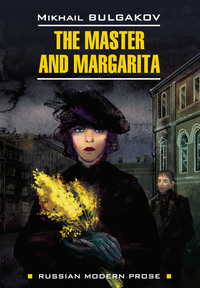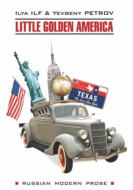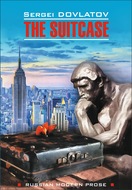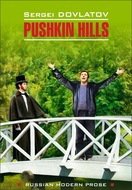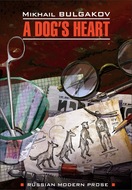Kitobni o'qish: «The Master and Margarita / Мастер и Маргарита. Книга для чтения на английском языке»
© Hugh Aplin, 2008
© Каро, 2020
Part One
1. Never Talk to Strangers
At the hour of the hot spring sunset at Patriarch’s Ponds two citizens appeared. The first of them – some forty years old and dressed in a nice grey summer suit – was short, well fed and bald; he carried his respectable pork-pie hat1 in his hand, and had a neatly shaved face adorned by spectacles of supernatural proportions in black horn frames. The second – a broad-shouldered, gingery, shock-headed young man with a checked cloth cap cocked towards the back of his head – was wearing a cowboy shirt, crumpled white trousers and black soft shoes.
The first was none other than Mikhail Alexandrovich Berlioz, the editor of a thick literary journal and chairman of the board of one of Moscow’s biggest literary associations, known in abbreviation as MASSOLIT2,3 while his young companion was the poet Ivan Nikolayevich Ponyrev, who wrote under the pseudonym Bezdomny.4
Entering the shade of the lime trees that were just becoming green, the writers first and foremost hurried towards a colourfully painted little booth with the inscription "Beer and Minerals”.
Yes, the first strange thing about that terrible May evening should be noted. Not just by the booth, but along the entire tree-lined avenue running parallel to Malaya Bronnaya Street, not a single person was about. At that hour, when people no longer even seemed to have the strength to breathe, when the sun, having heated Moscow up to an unbearable degree, was toppling in a dry mist somewhere down beyond the Garden Ring Road, nobody had come along here under the lime trees, nobody had sat down on a bench: the avenue was empty.
“Narzan,5 please,” requested Berlioz.
“There’s no Narzan,” replied the woman in the booth, and for some reason took umbrage6.
“Is there beer?” enquired Bezdomny in a hoarse voice7.
“They’ll be bringing beer towards evening,” the woman replied.
“What is there, then?” asked Berlioz.
“Apricot squash – only it’s warm,” said the woman.
“Well, come on, come on, come on!”
The apricot squash produced an abundant yellow foam, and there was a sudden smell of the hairdresser’s in the air. Having quenched their thirst8, the writers immediately started hiccuping; they settled up, and seated themselves on a bench with their faces to the pond and their backs to Bronnaya.
At this point the second strange thing occurred, concerning Berlioz alone. He suddenly stopped hiccuping; his heart gave a thump9 and disappeared somewhere for a moment, then returned, but with a blunt needle lodged in it. Moreover, Berlioz was seized by terror – groundless, but so powerful that he felt the urge to flee from Patriarch’s Ponds at once without a backward glance.
Berlioz glanced back in anguish, unable to understand what had frightened him. He turned pale, mopped his brow with his handkerchief and thought: “What is the matter with me? This has never happened before… my heart’s playing up… I’m overtired. Maybe it’s time to let everything go to the devil and be off to Kislovodsk…”
And then the sultry air thickened before him, and out of this air was woven a transparent citizen of very strange appearance. On his little head a jockey’s peaked cap, a little checked jacket – tight, and airy too. a citizen almost seven feet tall, but narrow in the shoulders, unbelievably thin, and a physiognomy, I beg you to note, that was mocking10.
Berlioz’s life had been shaped in such a way that he was not used to extraordinary phenomena. Turning still paler, he opened his eyes wide and thought in confusion: “It can’t be!.”
But, alas, it could, and the lanky citizen you could see through swayed to both left and right in front of him without touching the ground.
At this point Berlioz was horror-stricken11 to such a degree that he closed his eyes. And when he opened them, he saw that everything was over, the mirage had dissolved, the one in checks had vanished, and at the same time the blunt needle had dropped out of his heart.
“Well, I’ll be damned!” exclaimed the editor. “You know, Ivan, I almost had a seizure12 just now because of the heat! There was even something like a hallucination…” He tried to grin, but alarm was still dancing in his eyes, and his hands were trembling. However, he gradually calmed down, fanned himself with his handkerchief and, saying quite brightly, “Well, and so.” he renewed the speech that had been interrupted by the drinking of the apricot squash.
This speech, as was learnt subsequently, was about Jesus Christ. The thing was, the editor had commissioned a long antireligious poem from the poet for the next issue of his journal. Ivan Nikolayevich had written this poem, in a very short time too, but unfortunately had not satisfied the editor with it at all. Bezdomny had outlined the main character of his poem – Jesus, that is – in very dark colours, yet nonetheless, in the editor’s opinion, the whole poem needed to be written all over again. And so now the editor was giving the poet something in the way of a lecture on Jesus, with the aim of underlining the poet s basic error.
It is hard to say what precisely had let Ivan Nikolayevich down13 – whether it had been the graphic power of his talent, or his utter unfamiliarity with the question on which he was writing – but his Jesus had come out as just a living Jesus who had once existed: only, true, a Jesus furnished with all the negative features possible.
And Berlioz wanted to demonstrate to the poet that the main thing was not what Jesus was like, whether he was good or bad, but that this Jesus, as a person, had not existed in the world at all, and that all the stories about him were simply inventions, the most commonplace myth.
It must be noted that the editor was a well-read man, and pointed very skilfully in his speech to the ancient historians – for example, to the celebrated Philo of Alexandria1415 and to the brilliantly educated Flavius Josephus,1617 who had never said a word about the existence of Jesus. Displaying sound erudition18, Mikhail Alexandrovich also informed the poet, incidentally, that the passage in book fifteen, chapter forty-four of the celebrated Annales of Tacitus,1920 where the execution of Jesus is spoken of, is nothing other than a later forged interpolation.
The poet, to whom everything being imparted by the editor was news, listened to Mikhail Alexandrovich attentively with his lively green eyes fixed upon him, and only hiccuping occasionally, cursing in a whisper the apricot squash.
“There isn’t a single eastern religion,” said Berlioz, “in which, as a rule, a chaste virgin doesn’t give birth to a god. And without inventing anything new, in exactly the same way, the Christians created their Jesus, who in reality never actually lived. And it’s on that the main emphasis needs to be put…”
Berlioz’s high tenor resounded in the deserted avenue, and the deeper Mikhail Alexandrovich clambered into the thickets21 into which only a very educated man can clamber without the risk of coming a cropper, the more and more interesting and useful were the things the poet learnt about the Egyptian Osiris, the most merciful god and son of heaven and earth,2223 and about the Phoenician god Tammuz,2425 and about Marduk,2627 and even about the lesser-known stern god Huitzilopochtli,28 who was at one time much revered by the Aztecs in Mexico.29
And it was at precisely the moment when Mikhail Alexandrovich was telling the poet about how the Aztecs used to make a figurine of Huitzilopochtli from dough that the first person appeared in the avenue.
Subsequently – when, frankly speaking, it was already too late – various organizations presented their reports with a description of this person. A comparison of the reports cannot help but cause amazement. Thus in the first of them it is said that this person was small in stature30, had gold teeth and limped on his right leg. In the second the person was enormous in stature31, had platinum crowns and limped on his left leg. The third states laconically that the person had no distinguishing features.
It has to be acknowledged that not one of those reports is of any use whatsoever.
First of all: the person described did not limp on either leg, and was neither small nor enormous in stature, but simply tall. As far as his teeth are concerned, on the left side he had platinum crowns, and on the right gold ones. He wore an expensive grey suit and foreign shoes the same colour as the suit. He had his grey beret cocked jauntily over one ear, and under his arm he carried a walking stick with a black handle in the shape of a poodle’s head. To look at, he was about forty plus. Mouth a bit crooked. Clean-shaven. Dark-haired. The right eye black, the left for some reason green. Eyebrows black, but one higher than the other. In short – a foreigner.
After passing the bench on which the editor and the poet were located, the foreigner cast a sidelong glance at them, stopped, and suddenly sat down on the next bench, two steps away from the friends.
"German…" thought Berlioz.
"English…" thought Bezdomny. "And look at that – he’s not too hot to be wearing gloves."
But the foreigner cast his eye over the square of tall buildings bordering the pond, and it became apparent that he was seeing this place for the first time, and that it had grabbed his interest.
He arrested his gaze on the top storeys, in whose window panes there were dazzling reflections of the broken sunlight that was leaving Mikhail Alexandrovich for ever, then he moved it down to where the window panes had started darkening, as they do towards evening; he grinned condescendingly about something, screwed up his eyes, put his hands on the handle of the walking stick and placed his chin on his hands.
“Ivan,” said Berlioz, “your depiction of, for example, the birth of Jesus, the Son of God, was very good and satirical, but the real point is that a whole series of sons of god had already been born before Jesus – like, let’s say, the Phoenician Adonis, the Phrygian Attis, the Persian Mithras. To put it briefly, not one of them was ever born and none of them existed, including Jesus too, and it’s essential that, instead of depicting the birth or, let’s suppose, the visit of the Magi, you should depict the absurd rumours about that visit. Otherwise, according to your narrative, it turns out that he was actually born!”
At this point Bezdomny made an attempt to stop the hiccups that had him in agony and held his breath, and as a result he emitted a louder and more agonizing hiccup, and at that same moment Berlioz interrupted his speech, because the foreigner suddenly rose and headed towards the writers.
They looked at him in surprise.
“Excuse me, please,” he began on coming up, with a foreign accent, but without garbling the words, “if I permit myself, without being acquainted… but the topic of your learned conversation is so interesting that.”
Here he politely removed his beret, and nothing remained for the friends but to half-stand and exchange bows32.
“No, more likely French…” thought Berlioz.
“Polish?.” thought Bezdomny.
It is essential to add that from his very first words the foreigner made an abominable impression on the poet, yet was found by Berlioz rather to be pleasant – that is, not exactly pleasant, but. how can one put it. interesting, perhaps.
“May I take a seat?” asked the foreigner politely, and the friends, involuntarily somehow, moved apart; the foreigner settled in neatly between them and immediately entered the conversation.
“If I heard correctly, you were so good as to say there was never any Jesus on earth?” asked the foreigner, turning his green left eye towards Berlioz.
“Yes, you heard correctly,” replied Berlioz courteously, “that is precisely what I was saying.”
“Ah, how interesting!” exclaimed the foreigner.
“But what the devil does he want?” thought Bezdomny, and frowned.
“And were you in agreement with your companion?” enquired the stranger, turning to the right towards Bezdomny.
“The full hundred per cent!” confirmed the latter, who loved to express himself in a mannered and ornate fashion.
'Astonishing!” exclaimed the uninvited interlocutor and, looking around furtively for some reason and lowering his deep voice, he said: “Forgive my persistence, but my understanding was that, apart from anything else, you don’t believe in God either?” He made frightened eyes and added: “I swear I won’t tell anyone.”
“No, we don’t believe in God,” replied Berlioz, with a faint smile at the fright of the foreign tourist, “but it can be spoken about completely freely.”
The foreigner reclined against the back of the bench and asked, even emitting a little squeal of curiosity33:
“Are you atheists?”
“Yes, we’re atheists,” replied Berlioz, smiling, while Bezdomny thought angrily: “This foreign goose is being a real nuisance!”
“Oh, how charming!” the amazing foreigner cried, and he began twisting his head, looking first at one man of letters, then at the other.
“In our country atheism surprises no one,” said Berlioz with diplomatic politeness. “The majority of our population ceased consciously and long ago to believe in fairy tales about God.”
At this point the foreigner wheeled out the following trick: he stood up and shook the astonished editor’s hand, at the same time pronouncing these words:
“Permit me to thank you from the bottom of my heart!”
“And what is it you’re thanking him for?” enquired Bezdomny, blinking.
“For a very important piece of information, which is extremely interesting to me as a traveller,” the eccentric foreigner elucidated, raising a finger most meaningfully.
Evidently the important piece of information really had made a powerful impression on the traveller, because he looked round in alarm at the buildings, as though afraid of seeing an atheist at every window.
“No, he’s not English…" thought Berlioz, while Bezdomny thought: “Wherever did he get so good at speaking Russian, that’s what I wonder!” and frowned again.
“But permit me to ask you,” began the foreign guest after an anxious hesitation, “what’s to be done about the proofs of God’s existence, of which there are, as is well known, exactly five?”
“Alas!” replied Berlioz with regret. “Not one of those proofs is worth a thing, and mankind gave them up as a bad job long ago. You must agree, after all, that in the sphere of reason there can be no proof of the existence of God.”
“Bravo!” exclaimed the foreigner. “Bravo! You’ve repeated in its entirety that restless old man Immanuel’s idea on that score.34But here’s a curious thing: he completely demolished all five proofs, and then, as though in mockery of himself, constructed his own sixth proof!”
"Kant’s proof,” objected the educated editor with a thin smile, "is also unconvincing.35 And not for nothing did Schiller3637 say that the Kantian arguments on the question could satisfy only slaves, while Strauss3839 simply laughed at that proof.”
Berlioz spoke, yet at the same time he was thinking: "But all the same, who on earth is he? And why is it he speaks Russian so well?”
"This Kant should be taken and sent to Solovki40 for two or three years for such proofs!” Ivan Nikolayevich blurted out41 quite unexpectedly.
"Ivan!” whispered Berlioz, embarrassed.
But not only did the proposal to send Kant to Solovki not shock the foreigner, it even sent him into raptures42.
"Precisely, precisely,” he cried, and a twinkle appeared in his green left eye, which was turned towards Berlioz, "that’s the very place for him! I said to him then over breakfast, you know: ‘As you please, Professor, but you’ve come up with something incoherent! It may indeed be clever, but it’s dreadfully unintelligible. They’re going to make fun of43 you.’”
Berlioz opened his eyes wide. "Over breakfast… to Kant?… What nonsense is this he’s talking?” he thought.
"But,” the foreigner continued, with no embarrassment at Berlioz’s astonishment and turning to the poet, "sending him to Solovki is impossible for the reason that he’s already been in parts considerably more distant than Solovki for over a hundred years, and there’s no possible way of extracting him from there, I can assure you!”
“That’s a pity!” responded the quarrelsome poet.
“I think it’s a pity too,” confirmed the stranger, with a twinkle in his eye44, and continued: “But this is the question that’s troubling me: if there’s no God, then who, one wonders, is directing human life and all order on earth in general?”
“Man himself is directing it,” Bezdomny hastened to reply angrily to this, to be honest, not very clear question.
“I’m sorry,” responded the stranger mildly. “In order to be directing things, it is necessary, for all that, to have a definite plan for a certain, at least reasonably respectable, period of time. Permit me to ask you then, how can man be directing things, if he not only lacks the capacity to draw up any sort of plan for even a laughably short period of time – well, let’s say, for a thousand years or so – but cannot even vouch for his own tomorrow? And indeed,” here the stranger turned to Berlioz, “imagine that you, for example, start directing things, managing both other people and yourself – generally, so to speak, getting a taste for it – and suddenly you have… heh… heh… a lung sarcoma." The foreigner smiled sweetly, as if the idea of a lung sarcoma gave him pleasure – “yes, a sarcoma,” narrowing his eyes like a cat, he repeated the sonorous word, “and there’s an end to your directing! No one’s fate, apart from your own, interests you any more. Your family begin lying to you. Sensing something wrong, you rush to learned doctors, then to charlatans, and sometimes to fortune-tellers too. Like the first and the second, so the third too is completely pointless: you realize it yourself. And it all ends tragically: the man who just recently supposed he was directing something turns out suddenly to be lying motionless in a wooden box, and those around him, realizing there’s no more use whatsoever in the man lying there, burn him up in a stove. But it could be even worse: a man will have just decided to take a trip to Kislovodsk,” here the foreigner screwed his eyes up at Berlioz, “a trifling matter45, it would have seemed, but he can’t accomplish even that, since for some unknown reason he’ll suddenly go and slip and fall under a tram! Surely you won’t say it was he that directed himself that way? Isn’t it more correct to think that someone else completely dealt with him directly?” Here the stranger laughed a strange little laugh.
Berlioz had listened with great attention to the unpleasant story of the sarcoma and the tram, and some alarming ideas had started to torment him. “He isn’t a foreigner… he isn’t a foreigner…” he thought, “he’s an extremely strange type. but permit me, who on earth is he?…”
“You want to smoke, I see?” the stranger unexpectedly addressed Bezdomny. “What kind do you prefer?”
“You have various kinds, do you?” the poet, who was out of cigarettes, asked gloomily.
“Which do you prefer?” the stranger repeated.
“Well, Our Brand” Bezdomny replied bad-temperedly.46
The stranger immediately took a cigarette case out of his pocket and offered it to Bezdomny.
“Our Brand.”
Both the editor and the poet were shocked not so much by the fact that it was specifically Our Brand that were in the cigarette case, as by the cigarette case itself. It was of huge proportions, of pure gold, and, as it was being opened, a diamond triangle on its lid flashed blue and white fire.
At this point the writers had differing thoughts. Berlioz: “No, a foreigner!” and Bezdomny: “Well, the devil take it, eh!..”
The poet and the owner of the cigarette case lit up, while the non-smoking Berlioz refused.
“I shall have to counter him thus,” decided Berlioz. “Yes, man is mortal, and nobody is arguing against that. But the point is that…”
However, he had not had time to voice these words before the foreigner began:
“Yes, man is mortal, but that would still be just a minor problem. The bad thing is that he’s sometimes suddenly mortal, and that’s the whole point! And he can’t possibly say what he’s going to be doing the same evening.”
“An absurd sort of formulation of the question,” considered Berlioz, and retorted:
“Well, there really is some exaggeration here. This evening is known to me more or less exactly. It goes without saying that, if on Bronnaya a brick should fall on my head.”
“Without rhyme or reason47, a brick,” the stranger interrupted edifyingly, “will never fall on anybody’s head. And in particular, I can assure you, a brick doesn’t threaten you, not under any circumstances. You’re going to die a different death.”
“Perhaps you know what one precisely?” enquired Berlioz with completely natural irony, getting drawn48 into a really absurd sort of conversation. “And you’ll tell me?”
“Willingly,” responded the stranger. He sized Berlioz up, as though intending to make him a suit, muttered under his breath something like: “One, two. Mercury’s in the second house. the Moon’s gone. six – misfortune. the evening – seven…” and announced loudly and joyfully: “You’re going to have your head cut off!”
Bezdomny goggled with wild, angry eyes at the free-and-easy49 stranger, while Berlioz asked with a crooked grin:
“By whom, precisely? Enemies? Interventionists?”
“No,” replied his interlocutor, “by a Russian woman in the Communist League of Youth.”
“Hm…” mumbled Berlioz, irritated by the stranger’s little joke. “Well, excuse me, but that s hardly likely.”
“I beg you to excuse me too,” replied the foreigner, “but it’s so. Yes, I’d like to ask you what you’re going to be doing this evening, if it’s not a secret?”
“There’s no secret. In a moment I’m going to pop into my apartment on Sadovaya, and then at ten o’clock in the evening a meeting will be taking place at MASSOLIT, and I’m going to chair it.”
“No, that can’t possibly be,” objected the foreigner firmly.
“And why’s that?”
“Because,” the foreigner replied, and looked with narrowed eyes into the sky, where, with a presentiment of the cool of the evening, black birds were flying in noiseless lines, “Annushka has already bought the sunflower oil – and not only bought it, but even spilt it too. So the meeting won’t take place.”
At this point, quite understandably, silence fell beneath the lime trees.
“Forgive me,” began Berlioz after a pause, casting glances at the foreigner who was talking such rubbish, “what has sunflower oil got to do with it… and who’s this Annushka?”
“This is what sunflower oil has got to do with it,” began Bezdomny suddenly, evidently having decided to declare war on their uninvited interlocutor. “Have you, Citizen, ever happened to be in a clinic for the mentally ill?”
“Ivan!” exclaimed Mikhail Alexandrovich quietly.
But the foreigner was not in the least offended, and gave an extremely cheerful laugh.
“I have, I have, and more than once!” he exclaimed, laughing, but without taking his unlaughing eye off the poet. “Where haven’t I been! It’s just a pity I didn’t find the time to ask the professor what schizophrenia was. So do find it out from him for yourself, Ivan Nikolayevich!”
“How do you know my name?”
“Come, come, Ivan Nikolayevich, who doesn’t know you?” Here the foreigner pulled the previous day’s issue of The Literary Gazette from his pocket, and Ivan Nikolayevich saw his own image right on the front page, and beneath it his very own verse. But the proof of his fame and popularity, that just the day before had gladdened the poet, on this occasion did not gladden him in the least.
“Excuse me,” he said, and his face darkened, “can you wait for just a moment? I want to have a quick word with my comrade.”
“Oh, with pleasure!” exclaimed the stranger. “It’s so nice here under the lime trees, and, happily, I’m not hurrying off anywhere.”
“You know what, Misha,” began the poet in a whisper, pulling Berlioz aside50, “he’s no foreign tourist, but a spy. He’s a Russian émigré who’s made his way back over here. Ask for his papers, otherwise he’ll be off…”
“Do you think so?” Berlioz whispered anxiously, while thinking to himself: “He’s right, of course…”
“Believe you me” – the poet’s voice became hoarse in his ear – “he’s pretending to be a bit of an idiot so as to pump us about51 something. You hear the way he speaks Russian” – the poet was casting sidelong glances as he talked, looking to see that the stranger did not make a run for it – “come on, we’ll detain him, or else he’ll be off.”
And the poet drew Berlioz back towards the bench by the arm.
The stranger was not sitting, but standing beside it, holding in his hands some sort of booklet with a dark-grey binding, a thick envelope made of good-quality paper and a visiting card.
“Excuse me for forgetting in the heat of our argument to introduce myself to you. Here’s my card, my passport and my invitation to come to Moscow for a consultation,” said the stranger weightily, giving both men of letters a piercing look.
They became embarrassed. “The devil, he heard it all…” thought Berlioz, and indicated with a polite gesture that there was no need for papers to be shown. While the foreigner was thrusting them at the editor, the poet managed to make out on the card, printed in foreign letters, the word “Professor” and the initial letter of the surname – “W”.
“Pleased to meet you,” the editor was meanwhile mumbling in embarrassment, and the foreigner put the papers away into his pocket.
Relations thus restored, all three sat down once more on the bench.
“You’ve been invited here in the capacity of a consultant, Professor?” asked Berlioz.
“Yes, as a consultant.”
“Are you German?” enquired Bezdomny.
“Me?” the Professor queried, and suddenly became pensive. “Yes, if you like, I’m German…” he said.
“Your Russian’s brilliant,” remarked Bezdomny.
“Oh, I’m a polyglot in general and know a very large number of languages,” replied the Professor.
“And what do you specialize in?” enquired Berlioz.
“I’m a specialist in black magic.”
“Well, there you are!” Mikhail Alexandrovich had a sudden thought. “And.” – he faltered – “and you were invited here to use that specialization?” he asked.
“Yes, that’s what I was invited for,” confirmed the Professor, and elucidated: “Here in the State Library they found some original manuscripts of a tenth-century practitioner of black magic, Gerbert of Aurillac.5253 And so I’m required to decipher them. I’m the only specialist in the world.”
“Aha! You’re a historian?” asked Berlioz with respect and great relief.
“I am a historian,” the scholar confirmed, and added without reference to anything in particular: “There’s going to be an interesting bit of history at Patriarch’s Ponds this evening!”
And again both the editor and the poet were extremely surprised, but the Professor beckoned both of them close to him and, when they had leant towards him, he whispered:
“Bear it in mind that Jesus did exist.”
“You see, Professor,” responded Berlioz with a forced smile, “we respect your great knowledge, but on that question we ourselves adhere to a different point of view.”
“But you don’t need any points of view,” replied the strange Professor. “Simply he existed, and that s all there is to it.”
“But some sort of proof is required,” began Berlioz.
“No proofs are required,” replied the Professor, and he began to speak in a low voice, his accent for some reason disappearing: “Everything’s quite simple: in a white cloak with a blood-red lining, with the shuffling gait of a cavalryman, early in the morning of the fourteenth day of the spring month of Nisan…”54
